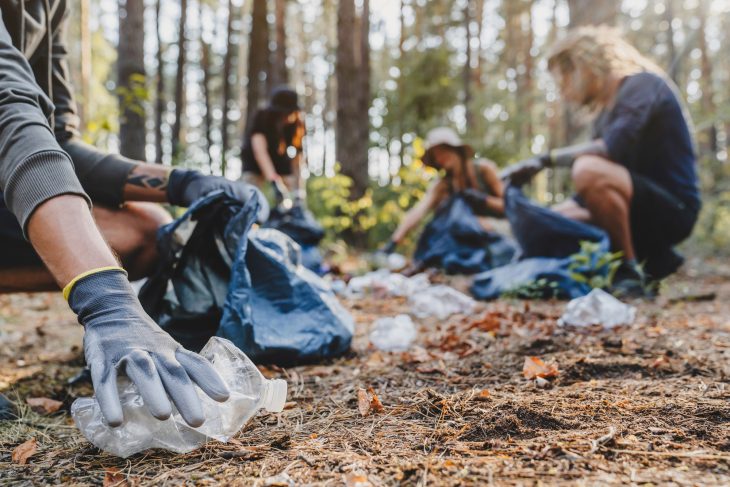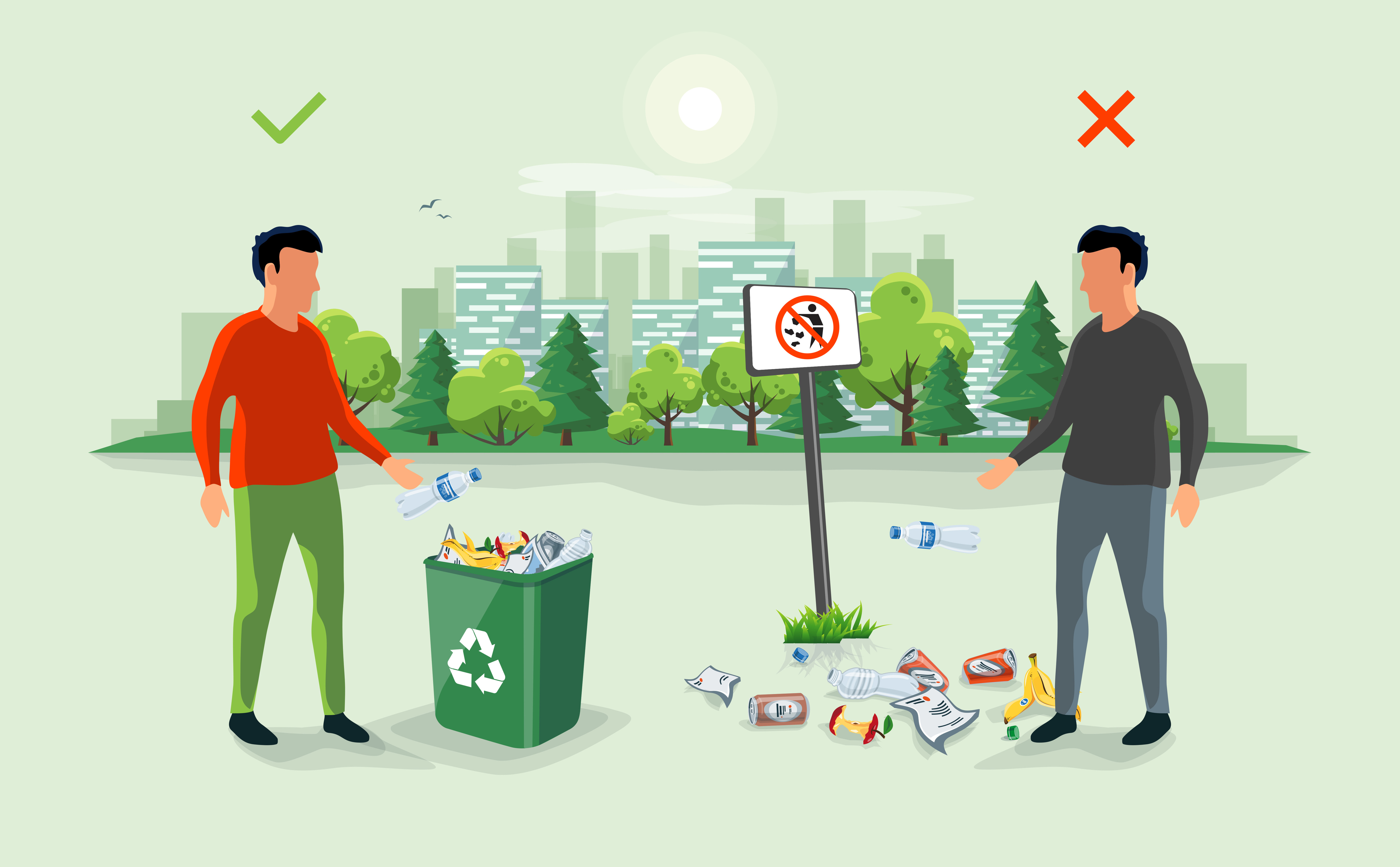
Littering is a global problem that affects all of us, yet many are unaware of the startling facts surrounding this issue. From its environmental impacts to alarming statistics on urban cleanups, it is important for everyone to understand how littering affects us in order to make sure that we stand together and take pride in our environment. In this article, we bring you 20 facts about littering so that you can better understand its implications and be more informed about how your actions can help reduce this harmful practice. Grab your coffee (in a reusable cup) and get ready – because here come some serious truths!
Definition of Littering
Littering is the act of improperly disposing of waste, such as trash or garbage, by leaving it in public places. This includes throwing cigarette butts on the ground, leaving food containers on park benches, and dumping waste in the streets. It is important to understand the definition of littering in order to contribute to a cleaner and healthier society.
The Extent of the Problem
Littering has become a worldwide issue with grave consequences for both the environment and people. In the United States alone, an estimated 51 billion pieces of litter are discarded annually, ranging from cigarette butts to plastic bottles. The effects of littering are not limited to just unsightly scenery; it can have disastrous consequences for wildlife, the air we breathe, and the water we drink. Additionally, littering costs taxpayers billions of dollars each year in cleanup efforts when that money could be better utilized for public services.
Impact on Wildlife
Litter such as plastic bags and aluminum cans can become life-threatening hazards to animals that mistake them for food or become entangled. Small fragments of litter can also get lodged in the digestive system of animals, causing internal injuries and even death. The effects of littering go beyond the visual pollution of our environment. It affects the delicate balance of ecosystems, and ultimately, the lives of all creatures who call them home.
Contribution to Pollution
Non-biodegradable waste, such as plastic bottles and bags, can take hundreds of years to decompose, clogging up our landfills and oceans in the process. And while some may argue that a single piece of litter won’t make much of a difference, the reality is that every little bit adds up. Each year, millions of tons of non-biodegradable waste are discarded improperly, leaving a lasting impact on our environment for generations to come.
Economic Costs
The financial burden of cleaning up litter can be substantial. Local governments and municipalities across the country allocate significant resources to keep our streets, parks, and waterways clean, funds that could be put to much better use if we all did our part. Additionally, litter has a negative impact on tourism and property values, compounding the problem by making it difficult to attract new businesses and investments to affected areas. Reducing litter is a win-win for everyone; it helps keep our communities clean and thriving, while also saving us all from the substantial economic costs associated with littering.

Litter and Disease
Discarded trash on the ground can create the perfect breeding ground for disease-carrying animals like rats and flies. These pests thrive on the excess food and water that litter provides, and can quickly spread dangerous infections to humans and other animals. In addition, litter can also contain harmful chemicals and toxins that can leach into the soil and groundwater, polluting our environment and causing long-term health effects.
Litter Degradation Time
Many types of litter actually take years, even decades, to degrade naturally. Plastic bags can take up to 20 years to break down, while Styrofoam cups may take up to 50 years. Cigarette filters, which are the most commonly littered item in the world, can take up to a decade to break down.
Plastic Litter
The problem of plastic litter is not new, but it continues to be a pressing issue that demands our attention. Despite the numerous campaigns and initiatives to promote awareness about plastic waste, it seems that the problem is only getting worse. The sheer volume of disposable plastic products used every day is staggering, and many of these items end up polluting our oceans and harming wildlife.
Cigarette Butts
Cigarette butts might be small, but the impact they have on our planet is massive. Every year, millions of cigarette butts are discarded on the ground, creating an unsightly litter problem. But the issue goes beyond just aesthetics. Cigarette filters contain harmful chemicals that can leach into the soil and waterways, posing a danger to wildlife and human health alike.
Food Waste
Every day, tons of food are wasted and dumped in landfills creating a serious litter problem. It’s a shocking reality that a significant amount of edible food is thrown away. In fact, food waste is a major contributor to greenhouse gas emissions and pollutes air and water as it decomposes in landfills. And when people toss food scraps or expired leftovers on the ground, they attract pests, such as rats and flies, which can lead to health and sanitation issues.

Microplastics
Microplastics are tiny pieces of plastic that measure less than 5 mm in length and are commonly found in a variety of household items. These microplastics are entering our oceans, contaminating our water, and threatening marine life. The impact of this litter problem extends far beyond the coastlines and has been shown to impact human health too.
Impact of Litter on Aquatic Ecosystems
Aquatic ecosystems are some of the most fragile and complex systems on our planet, and they’re being threatened by an unlikely enemy: our trash. Litter can cause significant damage to the health of aquatic ecosystems, and it’s a problem that’s only getting worse as our population continues to grow. Discarded plastics and other non-biodegradable waste can remain in the ocean for centuries, harming marine life, disrupting food chains, and altering ecosystems in ways we can’t even begin to comprehend.
Illegal Dumping
Illegal dumping is a serious problem that not only harms the environment, but also impacts the health and well-being of our communities. The sight and smell of scattered trash can be not only unpleasant, but also a breeding ground for disease-carrying pests. The problem of illegal dumping is not a localized issue, it affects both rural and urban communities across the world. Often, the motivation behind illegal dumping is driven by financial gain or convenience, but the long-term consequences and damage to the environment far outweigh any temporary benefits.
Litter and Climate Change
Littering is not only unsightly but, more importantly, it contributes to climate change. When litter breaks down, it releases harmful methane gas and other greenhouse gases. These gases trap heat in the atmosphere and contribute to global warming. Additionally, litter can obstruct waterways, harming the health of aquatic life and contributing to pollution.
Impact on Landscape
Litter is a menace that affects every facet of our environment. Its impact on our landscape is particularly disconcerting. From plastic bottles to cigarette butts, litter has the power to mar even the most idyllic of landscapes. The lush greenery of a park or the crystal-clear waters of a lake can be completely destroyed by the presence of litter.
Litter Laws
Litter laws have been a hotly debated topic in recent years. They’re designed to minimize the amount of litter on our streets and help preserve our environment. Current litter laws entail fines for people caught littering or even performing community service as a penalty for littering.

Litter Prevention
One strategy for litter prevention is to raise awareness about the issue and its consequences. This can be done through education campaigns, social media initiatives, and community events. Another effective approach is to provide people with more waste disposal options. This can include placing more trash bins in public areas and prioritizing recycling at festivals and events. Encouraging people to bring their own reusable bags, water bottles, and coffee cups is also an easy and effective way of reducing plastic waste.
Role of Companies
Companies play a crucial role in reducing litter and ensuring that their products don’t end up polluting our neighborhoods and waterways. From creating product packaging that’s easier to recycle, to educating customers on the proper disposal of their products, there are many steps that companies can take to reduce litter. And when they do, they’re not just benefiting the environment, they’re also protecting their brand reputation and showing customers that they care about the planet.
Community Involvement
By organizing beach cleanups, street sweeps, and other similar events, we can not only clean up the litter but also educate our communities on the harm it causes. Getting involved in local programs and initiatives to reduce litter shows that we’re willing to take the initiative to create a cleaner, safer environment.
The Power of Individual Action
The state of our environment is a reflection of our own habits and actions. Littering has become a common practice these days that has caused immense harm to our surroundings, wildlife, and oceans. The problem can seem too big for an individual to solve, but small steps can make a big difference. Each one of us can take the responsibility of keeping our surroundings clean. It just takes a simple action of disposing of the trash in the correct place.
Final Word
Our environment is the most precious gift that we have been given, yet many of us do not take the necessary steps to protect it. From clean-up operations to wildlife endangerment, littering affects everything around us. It is our responsibility to spread awareness and take a stand against this damaging and destructive issue. We must work together in order to reverse the effects that have been caused by unchecked littering and make our environment cleaner and healthier for generations to come. If we all act with an informed understanding of this plight, then perhaps we can contribute towards making this world greener and more beautiful than ever before. Every voice matters – so let’s join forces and make a difference!
Was this page helpful?
Our commitment to delivering trustworthy and engaging content is at the heart of what we do. Each fact on our site is contributed by real users like you, bringing a wealth of diverse insights and information. To ensure the highest standards of accuracy and reliability, our dedicated editors meticulously review each submission. This process guarantees that the facts we share are not only fascinating but also credible. Trust in our commitment to quality and authenticity as you explore and learn with us.
